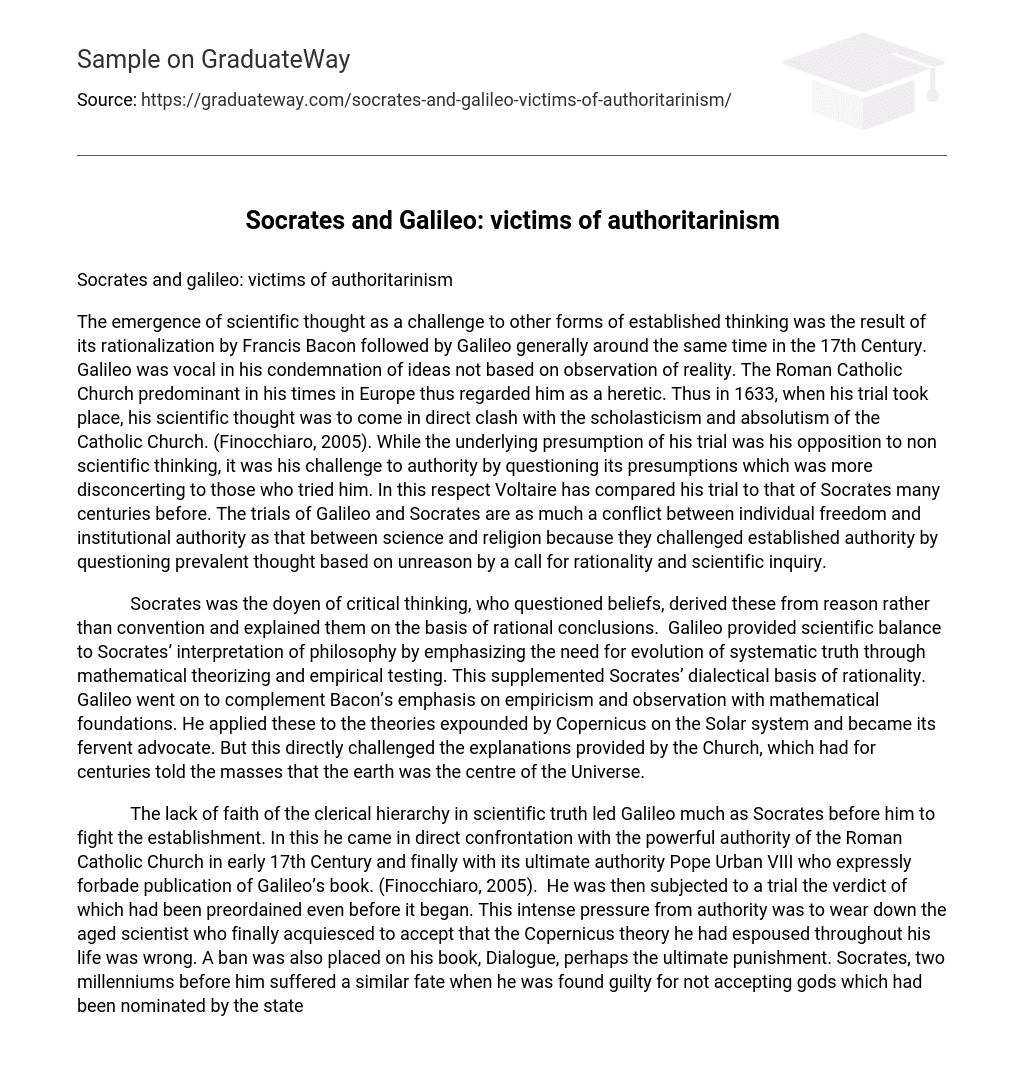The emergence of scientific thought as a challenge to other forms of established thinking was the result of its rationalization by Francis Bacon followed by Galileo generally around the same time in the 17th Century. Galileo was vocal in his condemnation of ideas not based on observation of reality. The Roman Catholic Church predominant in his times in Europe thus regarded him as a heretic. Thus in 1633, when his trial took place, his scientific thought was to come in direct clash with the scholasticism and absolutism of the Catholic Church. (Finocchiaro, 2005). While the underlying presumption of his trial was his opposition to non scientific thinking, it was his challenge to authority by questioning its presumptions which was more disconcerting to those who tried him. In this respect Voltaire has compared his trial to that of Socrates many centuries before. The trials of Galileo and Socrates are as much a conflict between individual freedom and institutional authority as that between science and religion because they challenged established authority by questioning prevalent thought based on unreason by a call for rationality and scientific inquiry.
Socrates was the doyen of critical thinking, who questioned beliefs, derived these from reason rather than convention and explained them on the basis of rational conclusions. Galileo provided scientific balance to Socrates’ interpretation of philosophy by emphasizing the need for evolution of systematic truth through mathematical theorizing and empirical testing. This supplemented Socrates’ dialectical basis of rationality. Galileo went on to complement Bacon’s emphasis on empiricism and observation with mathematical foundations. He applied these to the theories expounded by Copernicus on the Solar system and became its fervent advocate. But this directly challenged the explanations provided by the Church, which had for centuries told the masses that the earth was the centre of the Universe.
The lack of faith of the clerical hierarchy in scientific truth led Galileo much as Socrates before him to fight the establishment. In this he came in direct confrontation with the powerful authority of the Roman Catholic Church in early 17th Century and finally with its ultimate authority Pope Urban VIII who expressly forbade publication of Galileo’s book. (Finocchiaro, 2005). He was then subjected to a trial the verdict of which had been preordained even before it began. This intense pressure from authority was to wear down the aged scientist who finally acquiesced to accept that the Copernicus theory he had espoused throughout his life was wrong. A ban was also placed on his book, Dialogue, perhaps the ultimate punishment. Socrates, two millenniums before him suffered a similar fate when he was found guilty for not accepting gods which had been nominated by the state, introducing new deities and corrupting the youth. This happened in a purportedly democratic society in Greece in those times.
The trials of Galileo and Socrates are as much a conflict between individual freedom and institutional authority as that between science and religion because they challenged established authority by questioning prevalent thought based on unreason by a call to rationality and scientific inquiry. The physicist and the sage were to challenge the established hierarchy through their revolutionary ideas one in epistemology and the other in physics. Thus it was the forceful questioning of authority and not just the force of their revolutionary ideas that was to lead to their trials as very rightly interpreted by Voltaire.
Reference
1. Finocchiaro, Maurice A. (2005) Retrying Galileo. California. University of California.





